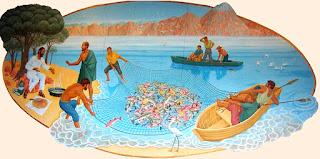Amos 8:1-12
Doom and Gloom
James Sledge July
17, 2022
The Prophet Amos 
by Irving Amen (1918-2011)
You may or may not be aware that this
congregation recently became part of something called VOICE or Virginias
Organized for Interfaith Community Engagement. VOICE is a coalition of around
50 faith communities who work together to address systemic social justice
issues in northern Virginia. Getting well connected with VOICE hasn’t been easy
during a pandemic, but I think you will be hearing about initiatives we want to
get involved with in the future.
Recently another church member and I attended a VOICE meeting that discussed trying to address some of the issues in what is a woefully inadequate Fairfax County mental health system. Even people with means struggle to access any sort of emergency care for a family member experiencing a mental health crisis, and the situation is even more dire for people who are poor.
Among the many things I learned at this meeting is that the rules for the state of Virginia require that any mental health medications for Medicaid patients must be prescribed by a psychiatrist. No prescriptions from general practitioners allowed. But here’s the catch. Not a single psychiatrist in Fairfax County accepts Medicaid patients. Good mental health care is difficult to find for anyone, but if you are poor, it is nearly impossible.
Hear this, you that trample on the needy, and bring ruin to the poor of the land, saying, “When will the new moon be over so that we may sell grain; and the sabbath, so that we may offer wheat for sale? We will make the ephah small and the shekel great, and practice deceit with false balances, buying the poor for silver and the needy for a pair of sandals, and selling the sweepings of the wheat.”


















